
About the Author and Translator of This Website
The author and translator, Ibrahim Gamard, is a Rumi scholar, born in the United States (in 1947). He has been strongly interested in mysticism (since 1966) and has been a student of sufism (since 1971). He became a semazen ("whirler") in Los Angeles in 1975 (photo below). That year, he read the entire English translation of Mevlana Rumi's Masnavi and realized that it is the greatest work of religious mysticism ever written.
 |
|---|
The next year, in 1976, a Mevlevi shaykh, Suleyman Dede Efendi of Konya, Turkey (photo below) came to the United States for the first time, visited Los Angeles, and taught the Whirling Prayer Ceremony (Sema). He initiated Ibrahim as a semazen (by placing the Mevlevi conical hat upon his head while praying and singing the tekbir: "Allahu Ekber...."). This was when Ibrahim became a member of the 750 year-old sufi order that derives from the teachings of Mawlânâ Jalâluddîn Rûmî, the Mevlevi ('Whirling Dervish") Order. During that visit, Dede Efendi led the Ceremony (photo below)--Ibrahim's first. Ibrahim became a Muslim (in 1984), completed the Pilgrimage [Hajj] to Mecca (in 1999), became a neyzen, or Turkish reed-flute player (in 1998), and became a translator (from Persian) of Rumi's poetry (in 1985).
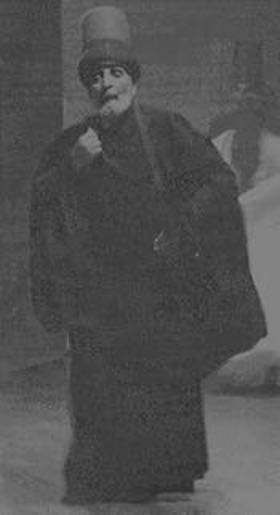 |
|---|
He was a Mevlevi whirler [semazen] for thirty years until 2007, when he participated in Sema in the Galata Mevlevi Sema hall (Semahane] in Istanbul.
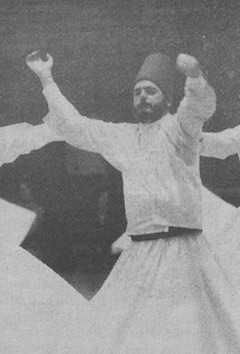 |
|---|
He was the disciple [murîd] of Shefik Jan Efendi (photo below), a Mevlevi shaykh and Masnavî teacher (Masnavî-khwân) in Istanbul, Turkey (from 1999 until the latter's death at age 96 on 24 January 2005) who was under the authority of the present world leader of the Mevlevi order, Faruk Hemdem Chelebi Efendi.
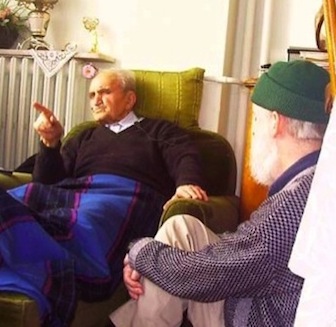 |
|---|
He played the Turkish reed-flute (ney) for eight years (until 2007, due to the onset of hand tremors) and played Mevlevi music, such as the Beyati Ayîn-i Sherîf. as well as Turkish hymns (illâhîs). The photo below shows him playing in front of the Galata Mevlevi-house in Istanbul.
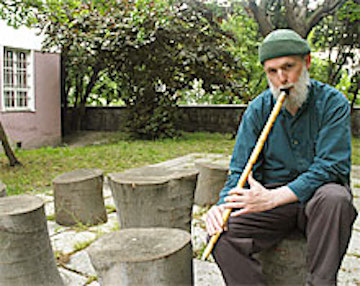 |
|---|
Professionally, he was a licensed psychologist in California (Ph.D. in Psychology, 1986) until he retired at the end of 2018. But his passion has long been for studying and began teaching himself classical Persian for the sole purpose of reading Rumi's poetry in the original language. In 1985 he began collaborating with Dr. Ravan Farhadi (photo below), an Afghan professor of Persian Literature at the University of California, Berkeley, in a translation of the nearly two thousand quatrains attributed to Rumi, together with commentary and Persian text, "The Quatrains of Rumi"), published in 2008.
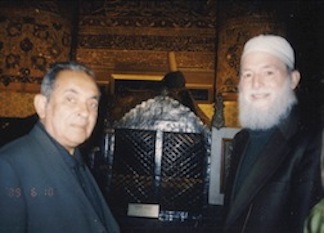 |
|---|
In 2003, an editor from a book publisher contacted him and said that she liked the style of his translations and explanatory notes and she invited him to write a book on Rumi and Muhammad. He translated many of the stories and poetic verses that praise the virtues of the Prophet Muhammad. The book was published in 2004 as "Rumi and Islam."
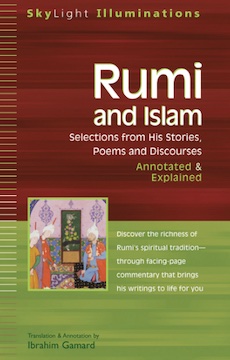 |
|---|
In 2007, he was made a Mevlevi Shaykh, or authorized teacher, by Faruk Hemdem Chelebi Efendi, the 22nd generation direct descendent of Mawlana Rumi and the 33rd Makam-i Chelebi, orhereditary leader of all Mevlevis.
 |
|---|
For many years, Ibrahim has been visiting Konya twice a year (September and December), whee his main acivities are standing in front of Rumi's tomb and visiting the International Mevlana Foundation building that is just beyond the walls of the Mevlana Museum, where he enjoys meeting fellow Mevlevis, as well as interesting visitors from around the world.
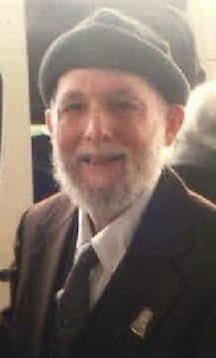 |
 |
|---|
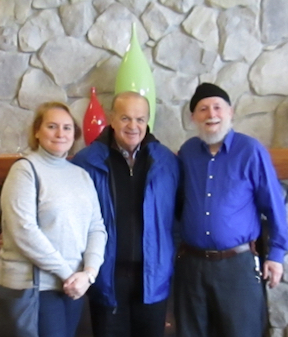 |
|---|
In 1997, the Translator began posting articles on the Internet concerning Rumi translation issues (on the newsgroup, "alt.fan.jalaludin_rumi"). By comparing English translations and versions with the original Persian, he attained an excellent understanding of the strengths and weaknesses of the books which have made Rumi the best-selling poet in America today.
In 1998, he was invited by a Rumi listserve group ("Sunlight" at yahoogroups.com, which offers daily translations and versions of Rumi's poetry) to add Persian transliterations to selections from R. A. Nicholson's (1926-34) literal translation of the Masnavi. This soon led to adding Qur'anic references, more explanatory notes, including some of Nicholson's commentary, and later from Anqaravi, the famous 17th century Turkish Mevlevi commentator (translated by the Translator into English from a 15-volume Persian translation of the Ottoman Turkish text).
Other than two previous British efforts, long out of print (Nicholson's two volumes of commentary, 1937 & 1940; C. E. Wilson's translation and commentary on Book II, 1910), these are the first translations from the Masnavi into English which offer explanations from the great commentators of the past about the meanings of Rumi's words and teachings therein.
He has made these translations and commentary freely available on the Internet (since 11/01) for lovers of Rumi's poetry who are motivated to study about Rumi's words and teachings in greater depth. As readers become more familiar, over time, with Rumi's metaphors, religious references, and mystical (sufi) teachings, they will begin to glimpse and appreciate the first levels of a spiritual wisdom so profound, vast, and permeated with Divine Love and Mercy, as to make the Masnavi so greatly revered for more than 750 years.
He has made presentations at a number of international Rumi conferences: "Rumi: Poet of Heart, Light of Mind" (Columbia University, New York City, 1997); "Rumi 2000" (California State University, San Bernardino, 2000); the "Internatinal Seminar in Commemoratin of the 800th Birthday of Mawlânâ Jalâluddîn Balkhî-Rûmî" (Kabul, 2007: "The Translation of the Complete Rubâ'iyât-e Jalâluddîn Muhammad Balkhî-Rûmî").
He has made presentations at two sufi conference: at the Sufism Symposium, San Francisco, 4/99, with a talk entitled "Rumi and Self-Discvery." He also spoke at "The First Annual International Symposium on Sayyid Nuruddin Shah Ni'matullah Vali," San Jose State University, 2002). In addition, he presented a talk entitled, "Themes of Peace and Lovein the Masnavi and Quatrains of Mawlana Rumi" at an international conference on "Conflict Resolution: A Dialogue Among Cultures and Religions," at Union Theological Seminary, New York City (2002).
He taught an ongoing class, twice per month, entitled, "Rumi Poetry and Whirling Prayer" which began with reading and discussion of his translated selections from the Masnavi (2000-2001). He also co-led a class twice per month for six years (in Berkeley, California): an hour of prayer-chanting, singing of ghazals (in Persian, with refrains sung by the rest of the group) and whirling prayer ceremony practice (to live or recorded music).
He has been living near Santa Rosa, California with his wife since 2001.
His first book of translations from Rumi's works was published in 2004: "Rumi and Islam: Selections from His Stories, Poems, and Discourses" (Skylight Paths Publishing), a book of translations from Persian of some of Rumi's beautiful stories about the virtues of the Prophet, his references to sayings (Ahâdîth) of the Prophet, and his praises of the greatness of the Prophet (upon whom be peace).
Also in 2004 was the publication "Hafiz: The Mystical Poets," which includes a preface written by him that explains some of the Islamic mystical symbolism of medieval Persian poetry.
His article, "Rumi and Self-Discovery" was published in "Islamica Magazine," Issue 15, Summer 2005.
In 2008, he was presented with a Certificate of Appreciation by Dr. Nuri Shimshekler of the Rumi Research and Application Center (Selçuk Üniversitesi Mevlâna Arashtima ve Uygulama Merkezi) of Seljuk Univerity in Konya, Turkey for his "contributions and studies about Mawlana in the U.S.A." This was in regard to his forthcoming book (done together with Dr. Ravan Farhadi), "The Quatrains of Rumi". The presentation was made at Rumi's mausoleum in Konya, together with an interview about the book. This was shown on Turkish television and articles about the book also appeared in Turkish newspapers and on news websites.
Also in 2008, "The Quatrains of Rumi" was published that contains translations, explanatory notes, and Persian texts of the nearly two thousand quatrains attributed to Rumi, 711 pages.
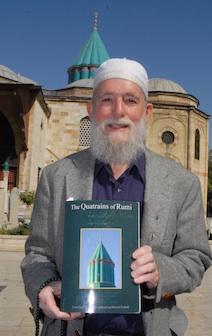 |
|---|
He had two articles published in the "Mawlana Rumi Review," the first academic journal dedicated to the works of Rumi: "The Popularity of Mawlana Rumi and the Mawlawi Tradition" (Volume 1, 2010) and a book review -- "Kenan Rifai, Listen: Commentary on the Spiritual Couplets of Mevlana Rumi, translated by Victoria Holbrook." (Volume 4, 2013).
He attended an international symposium on Sultan Walad, Mawlana Rumi's son, in December 2011 in Istanbul and Konya in which he read a paper, "The Dervish Lover in the Quatrains of Sultan Walad."
In 2014, he found audio files on the Internet of the entire Masnavi recited in Persian, which he used for an article on his website: "Listening to Masnavi While Reading the Persian/English." A brillaint software engineer saw the article and started the Masnavi Project, which had three members. Ibrahim contributed mainly to improving the accuracy of the English transltion. It contains complete and matching texts of the Masnavi with Perian text, English translation, and Turkish translation plus an excellent search feature. The website, www.masnavi.net, was launched in 2015.In Januart 2021, the developer of the site sold masnavi,net to Ibrahim and taught him how to upload corrections to the text, which Ibrahim has continued to do from time to time.
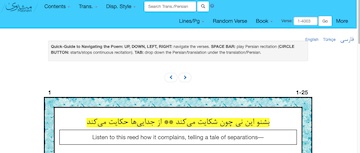 |
|---|
He participated in a press conference in Istanbul in December 2014, during which the world leader of the Mevlevi tradition, Faruk Hemdem Chelebi Efendi, together with several Mevlevi Shaykhs, spoke about problems related to the commercialization and degeneration of Mevlevi whirling dervish and whirling prayer ceremony performances.
In 2021, his article, "Jalal al-Din Rumi aand His Place in the History of Sufism" was published as part of the "Routledge Handbook on Sufism."
In December, 2017, Dr. Hülya Küçük, Professor of the History of Sufism at Necmettin Erbekan University in Konya, Turkey, invited him to edit a book on Rumi's son, Sultan Veled that she had written in Turkish and then translated by her into English. He agreed and corrected the English of most sentences, re-translated all quotations from Persian, and contributed so many other things that she promoted him to be co-author. The book, "Sultan Walad: in the Footsteps of Rumi and Shams" was published five years later in November 2022.
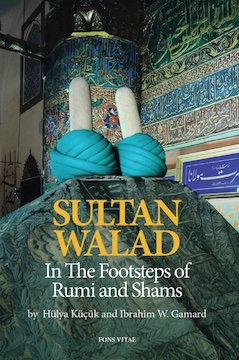 |
|---|
In December of 2018, he met Professor Alan Williams (of Manchester University, Great Britain) in Konya, Turkey and they subsequently became friends, talking on the phone once per week. Prof. Williams was so impressed by his knowledge of Rumi, that he invited him to send editorial and translaion suggestions for his new translations of the Masnavi. Subdsequently, Prof. Williams adopted many sugestions, which were incorporated in "The Masnavi of Rumi, Book One" (2020), "The Masnavi of Rumi, Book Two" (2020), and "The Masnavi of Rumi: Book Three" (forthcoming).
In 2020, he was asked by Professor Omid Safi (of Duke University) to translate the Risâla of Farîdûn Sepahsâlâr, the ealiest biography of Rumi, which has never been published in English. Subsequently, he invited Behnaz Hashemipour of Isfahan, Iran to be the lead translator and co-author. After she sent him a copy of the best edition, their work began in January 2022, gradually working on short selections at a time.
In September 2021, he was invited to participate as a Sheikh in the Sema (Whirling Prayer Ceremony) in Konya, together with Sheikh and Postneshin Nadir Karnibuyukler Efendi of Konya, who leads the Sema on Thursday nights (except in the winter) on the grounds of the Mevlana Museum. He participated in the Sema in Septmber 2022 (see image below, left; the faint line that appears to the right of his turban is a hanging tarp covering the reconstruction of the famous turquoise dome above Rumi's tomb. He participated in the Sema again in September 2023 (see larger photo below, right, and the largfer photo below it), when the dome, and the night lighting of it, was restored.
 |
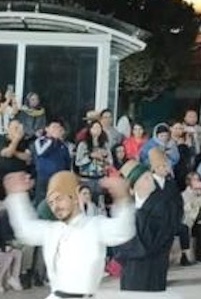 |
|---|
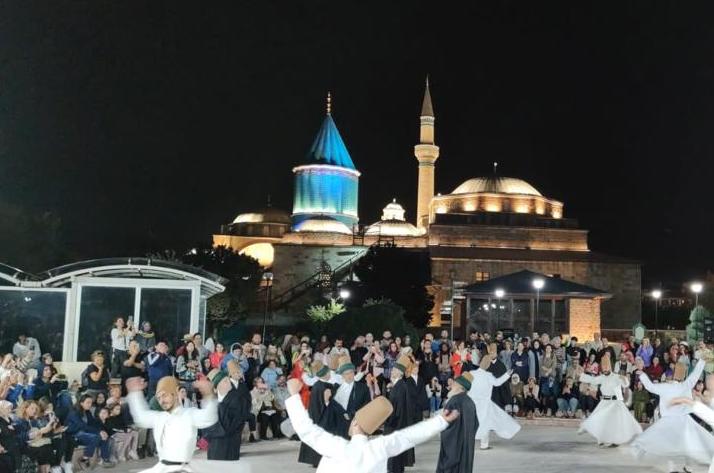 |
|---|
In December 2022, he was invited to read a paper in a symposium held at the Mevlana Research Institute of Selçuk University in Konya, Turkey on "Mevlana and Friendship," in December 2022 in Konya, Turkey. His paper was titled, "The Soul's Mirror is the Friend's Face." It was based on some verses from the second book of the Masnavi, together with commentary from the seventeenth century Ottoman Turkish commentary by Anqaravî (which he has in Persian translation) and the contemporary Iranian commentator, Karîm Zamânî.
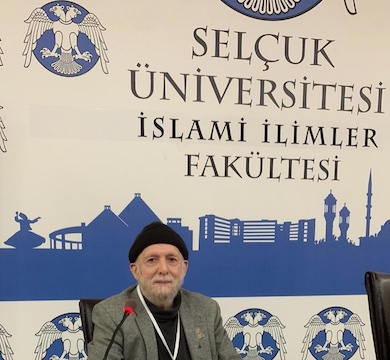 |
|---|
In December 2023, the second edition of "The Quatrains of Rumi" was published -- revised and updated.
 |
|---|
